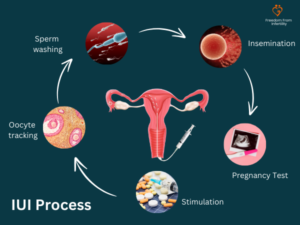
Overview
Why is it done?
IUI Procedure
Do's & Don'ts
Treatment Cost
FAQs
Overview
 Understanding IUI:
Understanding IUI:
Intrauterine insemination, or IUI, involves introducing high-quality sperm directly into the uterus to enhance the chances of fertilization. The primary goal is to bring the sperm as close to the egg as possible, facilitating conception. Decision to Perform IUI:
Whether IUI is recommended depends on various factors, including the doctor’s assessment and the specific circumstances of the patient.
Steps Involved in IUI Treatment:
- Ovarian Stimulation: The woman undergoes fertility medication to stimulate ovulation, increasing the number of eggs released during this phase.
- Monitoring of Ovulation: Ovulation is closely monitored through ultrasound and blood tests to pinpoint the optimal time for the IUI procedure.
- Sperm Preparation: The sperm sample undergoes a process known as sperm wash, where dead or slow-moving sperm cells are removed, leaving behind a concentrated, high-quality sperm.
- Insemination: The prepared, healthy sperm is then carefully injected into the woman’s uterus using a small catheter.
- Highest Success Rate: IUI tends to be most successful for couples facing male infertility issues, as the concentrated sperm directly introduced into the uterus can improve fertilization chances.
- Overall Range: The success rate of IUI typically ranges from 10% to 20% per cycle, with about 80% of couples achieving pregnancy after six cycles.
- Age Factor: Success rates tend to decrease with increasing age, with women over 40 having a success rate of about 4%.
- Increased Pregnancy Chances: By placing sperm directly in the uterus, IUI enhances the likelihood of fertilization, especially beneficial for couples with mild fertility issues.
- Affordability: IUI is generally more cost-effective compared to more complex treatments like IVF, making it accessible to a broader range of couples.
- Minimal Discomfort: The procedure is relatively simple, often without the need for general anesthesia, resulting in less pain and discomfort.
- No Ovulation Stimulation Needed: In some cases, IUI can be performed without the use of ovulation-stimulating medications, reducing the risk of associated complications.
- Combinable with Other Treatments: IUI can be combined with additional fertility treatments to further improve the chances of success, such as ovulation induction or intracytoplasmic sperm injection (ICSI).
- Lower Risk of Multiple Pregnancies: Compared to treatments like IVF, IUI carries a lower risk of multiple pregnancies, which can reduce complications for both mother and babies.
- Beneficial for Male Infertility: IUI can effectively address some male fertility issues by delivering a higher concentration of healthy sperm closer to the egg.
- Lower Success Rates: Compared to more advanced treatments such as IVF, IUI may have lower success rates, particularly for specific fertility issues.
- Increased Risk of Multiple Pregnancies: IUI can raise the chances of twins, triplets, or more, which may result in higher pregnancy and childbirth complications.
- Potential for Infection: The insertion of a catheter during the IUI procedure carries a slight risk of infection, especially in cases of existing reproductive infections.
- Limited Effectiveness for Some Cases: IUI may not be as effective for couples with severe infertility issues such as blocked fallopian tubes or severe male factor infertility.
Why is it done?
Understanding Intrauterine Insemination (IUI) for Enhanced Fertility
Intrauterine Insemination (IUI) is a straightforward and effective fertility treatment designed to boost the chances of conception. It involves the artificial placement of a highly concentrated sample of healthy and active sperm directly into the uterus through the cervix, bypassing natural barriers.
Indications for IUI:
Intrauterine Insemination (IUI) is a straightforward and effective fertility treatment designed to boost the chances of conception. It involves the artificial placement of a highly concentrated sample of healthy and active sperm directly into the uterus through the cervix, bypassing natural barriers.
Indications for IUI:
- Endometriosis:
- For individuals with endometriosis struggling to conceive, IUI can be beneficial. The medication used in IUI treatment stimulates the production of healthy eggs, thereby increasing the likelihood of pregnancy.
- Cervical Issues:
- Scarring or mucosa production problems in the cervix can hinder natural pregnancy. IUI circumvents these issues by delivering sperm directly into the uterus, ensuring a higher concentration of robust sperm available for fertilization.
- Unexplained Infertility:
- In cases where the root cause of infertility remains unknown, IUI can be an effective approach. Medications to induce ovulation, combined with the direct placement of sperm into the uterus, offer increased chances of conception for couples.
- Male Infertility:
- When the male partner experiences challenges such as a low sperm count, reduced motility, or abnormal morphology, IUI can help. This technique allows the selection of the healthiest sperm for fertilization, overcoming male fertility issues.
- Donor Sperm:
- For females who do not have fertility concerns but require donor sperm to conceive, IUI is a commonly chosen procedure. It offers a less invasive and effective method of utilizing donor sperm to achieve pregnancy.
IUI Procedure
What is IUI?
Intrauterine Insemination (IUI), also known as artificial insemination, is a fertility procedure designed to enhance the chances of conception by placing healthy sperm directly into the uterus during ovulation. This proximity to the fallopian tubes facilitates the fertilization process, making it simpler and more efficient.
Length of the IUI Process:
The complete IUI procedure typically spans around four weeks, equivalent to a menstrual cycle. Here’s a breakdown of the process from start to finish:
Before undergoing IUI, certain tests are conducted to ensure the procedure’s suitability and address your specific fertility needs. These tests may include:
Following the IUI procedure, some common side effects may include:
Pain Level During IUI:
IUI is considered a minimally invasive procedure and does not usually require sedation or painkillers. However, some individuals may experience mild discomfort or cramping during and immediately after the insemination.
Results After IUI:
Initial signs following the treatment may appear immediately, but true pregnancy symptoms typically start to show within two weeks. A pregnancy test should be taken 14 days post-IUI to confirm pregnancy, as this allows sufficient time for the pregnancy hormone (hCG) to become detectable.
Number of IUI Cycles Before IVF:
Most fertility specialists recommend completing three rounds of IUI cycles before considering more advanced procedures such as IVF. However, for individuals over 40, some specialists may suggest transitioning to IVF after just one cycle of IUI due to higher success rates and the importance of prompt treatment. In conclusion, Intrauterine Insemination (IUI) is a straightforward and effective fertility procedure that offers hope to couples struggling with conception. Understanding the process, following precautions, and maintaining a healthy lifestyle can contribute to the success of the treatment.
Intrauterine Insemination (IUI), also known as artificial insemination, is a fertility procedure designed to enhance the chances of conception by placing healthy sperm directly into the uterus during ovulation. This proximity to the fallopian tubes facilitates the fertilization process, making it simpler and more efficient.
Length of the IUI Process:
The complete IUI procedure typically spans around four weeks, equivalent to a menstrual cycle. Here’s a breakdown of the process from start to finish:
- Stimulating Egg Growth:
- The woman begins taking oral or injectable medications to encourage the development and maturation of eggs.
- Injectable drugs are usually administered for 8 to 12 days, while oral medications are taken for 5 days.
- Ultrasound & Blood Tests:
- Quick ultrasound sessions occur every few days to monitor egg growth and ovarian response to the medications.
- Blood tests are conducted to assess hormone levels influencing ovarian and egg development.
- Ovulation Induction:
- Once the eggs are deemed “ready,” a trigger injection is administered to prompt ovulation, typically within 36 hours.
- Sperm Sample Processing:
- The male partner’s sperm sample or donor sperm is processed in the lab.
- Sperm washing is done to remove immobile sperm, debris, and seminal fluid, leaving a concentrated, high-quality sample.
- Insemination Procedure:
- A thin, flexible catheter is used to inject the processed sperm directly into the uterus.
- The procedure is quick, painless, and usually completed within seconds.
- In some cases, two inseminations may be recommended during the same cycle.
- Follow-Up Care:
- Progesterone levels are often checked about a week after ovulation.
- Additional hormone support may be suggested to prepare the uterine lining for potential pregnancy.
Before undergoing IUI, certain tests are conducted to ensure the procedure’s suitability and address your specific fertility needs. These tests may include:
- Uterine examination.
- Blood tests to check hormone levels.
- Semen analysis for the male partner.
- Ultrasounds to assess the uterus.
- Screening for infections and other health conditions.
- Take folic acid supplements.
- Maintain a balanced diet and overall well-being.
- Avoid strenuous activities.
- Ensure proper sleep and rest.
- Refrain from smoking, alcohol consumption, and certain medications.
- Limit exposure to radiation sources.
- Attend regular follow-up appointments with your fertility specialist.
Following the IUI procedure, some common side effects may include:
- Mild cramping.
- Spotting for a day or two.
- Most individuals can resume regular activities shortly after the procedure.
Pain Level During IUI:
IUI is considered a minimally invasive procedure and does not usually require sedation or painkillers. However, some individuals may experience mild discomfort or cramping during and immediately after the insemination.
Results After IUI:
Initial signs following the treatment may appear immediately, but true pregnancy symptoms typically start to show within two weeks. A pregnancy test should be taken 14 days post-IUI to confirm pregnancy, as this allows sufficient time for the pregnancy hormone (hCG) to become detectable.
Number of IUI Cycles Before IVF:
Most fertility specialists recommend completing three rounds of IUI cycles before considering more advanced procedures such as IVF. However, for individuals over 40, some specialists may suggest transitioning to IVF after just one cycle of IUI due to higher success rates and the importance of prompt treatment. In conclusion, Intrauterine Insemination (IUI) is a straightforward and effective fertility procedure that offers hope to couples struggling with conception. Understanding the process, following precautions, and maintaining a healthy lifestyle can contribute to the success of the treatment.
Do's & Don'ts
Guide to IUI Treatment: Cost, Factors, and Precautions
Intrauterine Insemination (IUI) is a popular fertility treatment known for its simplicity, effectiveness, and relatively lower cost compared to other procedures like IVF. Here are some important points to consider if you are contemplating IUI:
Do’s:
Intrauterine Insemination (IUI) is a popular fertility treatment known for its simplicity, effectiveness, and relatively lower cost compared to other procedures like IVF. Here are some important points to consider if you are contemplating IUI:
Do’s:
- Prioritize Your Health:
- Ensure you are physically and mentally fit before embarking on the journey to conceive.
- Manage Stress:
- Seek support and address any challenges to maintain a stress-free environment.
- Stay Physically Active:
- Engage in moderate exercise to keep your body healthy and prepared.
- Get Adequate Sleep:
- Aim for 8 hours of quality sleep each night to support overall well-being.
- Maintain a Balanced Diet:
- Focus on a nutritious diet that includes essential vitamins and minerals.
- Follow Your Specialist’s Advice:
- Listen to your IVF specialist’s recommendations and guidance throughout the process.
- Take It Step by Step:
- Approach each stage of the treatment positively and patiently.
- Avoid Alcohol and Smoking:
- Refrain from consuming alcohol and smoking as they can impact fertility negatively.
- Reduce Caffeine Intake:
- Limit your intake of caffeinated beverages to promote optimal fertility.
- Abstain from Ejaculation:
- Avoid ejaculation 2-3 days before the collection of the semen sample for IUI.
- Process Overview:
- IUI involves placing healthy sperm directly into the uterus, increasing the chances of fertilization.
- Sperm is washed and concentrated before insertion, aiding in the meeting of sperm and egg.
- Suitable for Various Conditions:
- IUI is beneficial for conditions such as mild endometriosis, cervical issues, low sperm count, and erectile dysfunction.
- It is a non-invasive procedure that can utilize sperm from the male partner or a donor.
Treatment Cost
Average Cost of IUI in India:
- Range of Costs:
- IUI is generally more cost-effective compared to other fertility treatments.
- Type of Clinic:
- Advanced clinics with modern technologies may have higher costs.
- Location of the clinic also plays a role in determining the cost.
- Number of Cycles:
- Success rates vary, and multiple IUI cycles may be required, especially for women over 40.
- Patient’s Age:
- Advanced maternal age can affect success rates, necessitating more cycles.
- Medication for Ovulation Stimulation:
- Costs vary based on the type and dosage of medications used.
- Follicle Monitoring:
- Ultrasounds and monitoring procedures add to the overall cost of treatment.
- Follow Medication Instructions:
- Adhere to prescribed medications for ovulation stimulation.
- Regular Monitoring:
- Attend scheduled ultrasounds and blood tests to track progress.
- Healthy Lifestyle:
- Maintain a balanced diet, engage in light exercise, and get adequate rest.
- Avoid Stressors:
- Minimize stress and practice relaxation techniques.
- Patience and Positivity:
- Approach the treatment with a positive mindset and patience for the process.
FAQs
FAQs About IUI
- Is IUI Painful?
- The IUI procedure is typically not painful. Most individuals describe it as discomfort similar to menstrual cramps. Any discomfort usually subsides quickly after the procedure.
- How Many Times Should IUI be Done?
- The number of recommended IUI cycles varies based on individual circumstances. Your fertility specialist will consider factors such as age, health, and previous attempts to determine the appropriate number of cycles.
- What is the Ideal Timing for IUI?
- IUI is usually performed around the time of ovulation, typically within 24 to 36 hours after the surge in luteinizing hormone (LH). Monitoring ovulation through ultrasound and hormone tests helps pinpoint the optimal timing.
- Can IUI be Combined with Fertility Medications?
- Yes, IUI can be combined with fertility medications to enhance the chances of success. Medications such as Clomid or injectable hormones are often used to stimulate the ovaries and increase the number of eggs released.
- How Long Does the IUI Procedure Take?
- The actual insemination process during IUI only takes a few minutes. However, individuals should plan to spend around 30 minutes to an hour at the clinic for the entire procedure, including preparation and recovery time.
- What Should I Expect After an IUI Procedure?
- After the IUI procedure, you can resume your normal activities immediately. Some women may experience mild cramping or spotting, which is normal. It is advisable to avoid strenuous exercise for the rest of the day.
- What Factors Affect the Success of IUI?
- Several factors can influence the success of IUI, including age, the cause of infertility, the woman’s ovarian reserve, and the quality of sperm used. Your fertility specialist will discuss these factors with you in detail.
- Can IUI Result in Multiple Pregnancies?
- Yes, one of the risks of IUI is the potential for multiple pregnancies, such as twins or triplets. Your fertility specialist will monitor your cycle closely to minimize this risk.
- How Soon Can I Take a Pregnancy Test After IUI?
- It is recommended to wait about two weeks after the IUI procedure before taking a home pregnancy test. Testing too early may result in a false negative result.
- What Happens if IUI is Unsuccessful?
- If an IUI cycle is unsuccessful, your fertility specialist will discuss the next steps with you. This may include repeating the IUI procedure, exploring other fertility treatments such as IVF, or further testing to identify any underlying issues.

